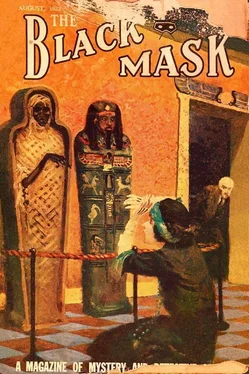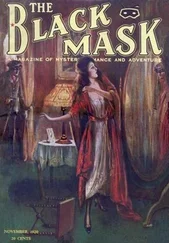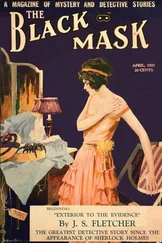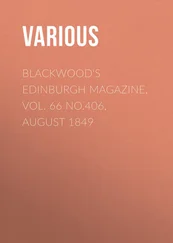John Baer - The Black Mask Magazine (Vol. 5, No. 5 — August 1922)
Здесь есть возможность читать онлайн «John Baer - The Black Mask Magazine (Vol. 5, No. 5 — August 1922)» весь текст электронной книги совершенно бесплатно (целиком полную версию без сокращений). В некоторых случаях можно слушать аудио, скачать через торрент в формате fb2 и присутствует краткое содержание. Город: New York, Год выпуска: 1922, Издательство: Pro-Distributors Publishing Company, Жанр: Детектив, на английском языке. Описание произведения, (предисловие) а так же отзывы посетителей доступны на портале библиотеки ЛибКат.
- Название:The Black Mask Magazine (Vol. 5, No. 5 — August 1922)
- Автор:
- Издательство:Pro-Distributors Publishing Company
- Жанр:
- Год:1922
- Город:New York
- ISBN:нет данных
- Рейтинг книги:4 / 5. Голосов: 1
-
Избранное:Добавить в избранное
- Отзывы:
-
Ваша оценка:
- 80
- 1
- 2
- 3
- 4
- 5
The Black Mask Magazine (Vol. 5, No. 5 — August 1922): краткое содержание, описание и аннотация
Предлагаем к чтению аннотацию, описание, краткое содержание или предисловие (зависит от того, что написал сам автор книги «The Black Mask Magazine (Vol. 5, No. 5 — August 1922)»). Если вы не нашли необходимую информацию о книге — напишите в комментариях, мы постараемся отыскать её.
The Black Mask Magazine (Vol. 5, No. 5 — August 1922) — читать онлайн бесплатно полную книгу (весь текст) целиком
Ниже представлен текст книги, разбитый по страницам. Система сохранения места последней прочитанной страницы, позволяет с удобством читать онлайн бесплатно книгу «The Black Mask Magazine (Vol. 5, No. 5 — August 1922)», без необходимости каждый раз заново искать на чём Вы остановились. Поставьте закладку, и сможете в любой момент перейти на страницу, на которой закончили чтение.
Интервал:
Закладка:
The jurymen glanced at one another and nodded.
“I don’t think it’ll be necessary,” the foreman said. “Still, as a matter of routine, I suppose—” He smiled. “You win, Colonel.”
His Thirteenth Wife
by Herbert Raymond Carter
I
With Jonas Bruckner, marriage had become a habit — and a highly profitable one. Under various aliases, he had led a dozen different wives to the altar — and later followed them to the grave. In each instance he had survived to find himself a wiser and richer man.
Naturally, the statutes concerning bigamy had never troubled him. In every venture he had been legally free of his previous bride before contracting the responsibilities resulting from another wedding. And by uncanny good fortune, the laws against murder had left him unscathed and unsuspected.
Since the days of his youth, Bruckner had worshipped Bluebeard as his hero. In his teens he had devoured newspaper accounts of the doings of such modern maniacs. Invariably their unskilful slaying of successive spouses, in order to collect insurance, had ended in their intimate association with the scaffold, the electric chair or the guillotine. Bruckner would smile in his sleeve over their clumsiness, and in choosing his vocation, resolved that he at least, would never be so crude.
Insurance companies, he had learned, were customarily curious, and the profession which Bruckner proposed to enter made inquisitiveness on the part of others extremely undesirable. In the first place, he determined never to give his name to any maiden or widow who carried a policy on her life. Should his prospects be insured they must allow that protection to lapse upon the assurance that the bridegroom possessed plenty for two. Thus he eliminated one source of suspicion as to his motives. If, however, those who ensnared his accordeon-like heart happened to be wealthy, Bruckner certainly could not be blamed. Besides, he always made it a rule to state to the license clerk that he was a bachelor, casually adding that he was well-to-do and retired.
This knowledge was also the bait he persistently dangled in order to catch his intended victims. The plan had been remarkably successful, to which Bruckner’s worldly possessions bore mute testimony. Frequently money talks — but Bruckner’s was as silent as the graves from which it load been obtained. Under each new alias, he maintained a modest bank account for current expenses. None of them had been large enough to cause him any regret if he suddenly found it inconvenient to cash another check or present himself in person to claim his balance. The bulk of his fortune he kept in cash in several widely separated safe deposit vaults. To the banks where these sums were stored, he was known under various names, and was understood to be an eccentric man who traveled extensively.
The names he assumed for this purpose were never employed for any other form of his activities. His long absences and semi-occasional appearances caused no comment, and had never resulted in any undue curiosity. In fact, the officials of these “reserve” institutions, as he termed them, were not aware of the contents of the boxes Bruckner rented. Probably they imagined that he used them for storing papers.
One, however, did contain something vastly different. In it were the tools of his trade — poisons of varying natures which he picked up at intervals in infinitesimal quantities in various parts of the world. Being versatile, he liked to vary his method of operation and took a genuine pride in his work. Mad he undoubtedly was — but the man was an artist, and no manufacturer or financier or creator of beautiful things ever took more satisfaction in his accomplishments than did Bruckner.
The one fly in the ointment was the fact that he could never confide to anyone just how clever he really was. To atone for this, and by way of diversion, he occasionally indulged in criminalities of a totally different nature, in fields where he might share his triumphs with others. He had a smattering of medicine and knew much chemistry, both of which he studied with sinister intent. He had played at being an amateur cracksman and had been complimented upon his skill in opening safes. Likewise, he had participated in several notorious Black-hand outrages and was well and favorably known in those circles. That is, the personality he assumed for this purpose, was known to such associates. Thus Bruckner had broadened his knowledge of ways and means of producing death in secret, and had familiarized himself with other branches of the trade, upon which he might fall back in case wife murder ever became an unhealthy occupation.
Bruckner flattered himself that during the whole of his career he had never made a single mistake. Not once had he been regarded as anything but a sincere mourner at the biers of his dear departeds. Never had he run afoul of coroner or police. At times he chuckled over his remarkable capabilities and congratulated himself upon his caution and truly exceptional foresight. Perhaps his success was due to the fact that he concentrated upon crime in its more subtle branches, and had never been addicted to any vice, either petty or great.
Nor had a pretty face ever tempted him. During the whole of his marital adventures, Bruckner had never once been in love — not even the victim of a passing infatuation. Business before pleasure was his motto and he adhered to it strictly. Because he found the courtship stage of his engagements a trying ordeal, marriage usually followed his proposals swiftly. With grim humor, he often boasted to himself that he had no heart, and in view of this fact, he was reluctant to indulge needlessly in silly lovemaking.
The women of his choice were invariably rather mature and usually unromantic. The more homely they might be the better satisfied he was. A young and attractive wife might have admirers who would interfere with his plans. She would also be more likely to have relatives who might have too much to say and to whom her death would be a real bereavement. Widows with children were banned. He had an aversion to stepsons and daughters about the house. Instead, this pseudo lonely bachelor always sought a matron similarly situated — each with a tidy sum to support them, and both desiring a quiet comfortable home.
There was method in his rule. Not only was he assured of privacy in the domicile about to be established, but he could not be accused of the unpardonable crime of marrying for money. Bruckner was both sensitive and proud. He valued the good opinion of the community — because it was an asset in his curious business. To pick out a bride of great wealth would mean additional difficulty in collecting his inheritance after the obsequies. Such details would be bound to be annoying and Bruckner loved simplicity in this respect.
A few thousand dollars — always less than his own little nest egg — and perhaps a small property upon which no other heirs had any claim — were to be readily gathered in without the formality of court proceedings or the advice of counsel. After each deal, he cashed in his gains, opened a new bank account under a new name, and stored his net profits in one of his safety deposit boxes. This had been going on for years.
It was true that such gradual means of accumulating wealth necessitated many marriages. None of his wives had lived more than three years after the wedding, but in no case did he cause a death under twelve months. He remained prudent rather than avaricious or hasty. He never sought a rapid denouement at the risk of personal safety. Moreover, his wives all died seemingly natural deaths and were fittingly interred. Bruckner would not countenance anything so crude as to savor of murder. Also, Bruckner had a certain sentiment about proper burials. As a result each simple ceremony was marked with unostentatious respect, while the countryside was dotted here and there with nicely cared for graves and tastefully adequate tombstones. Everything he did was done very well.
Читать дальшеИнтервал:
Закладка:
Похожие книги на «The Black Mask Magazine (Vol. 5, No. 5 — August 1922)»
Представляем Вашему вниманию похожие книги на «The Black Mask Magazine (Vol. 5, No. 5 — August 1922)» списком для выбора. Мы отобрали схожую по названию и смыслу литературу в надежде предоставить читателям больше вариантов отыскать новые, интересные, ещё непрочитанные произведения.
Обсуждение, отзывы о книге «The Black Mask Magazine (Vol. 5, No. 5 — August 1922)» и просто собственные мнения читателей. Оставьте ваши комментарии, напишите, что Вы думаете о произведении, его смысле или главных героях. Укажите что конкретно понравилось, а что нет, и почему Вы так считаете.












